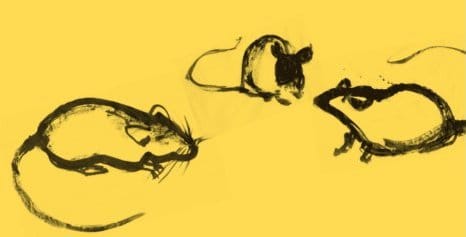And I start wondering how they came to be blind.
If it was congenital, they could be brothers and sister,
and I think of the poor mother
brooding over her sightless young triplets.
Or was it a common accident, all three caught
in a searing explosion, a firework perhaps?
If not,
if each came to his or her blindness separately,
how did they ever manage to find one another?
Would it not be difficult for a blind mouse
to locate even one fellow mouse with vision
let alone two other blind ones?
And how, in their tiny darkness,
could they possibly have run after a farmer’s wife
or anyone else’s wife for that matter?
Not to mention why.
Just so she could cut off their tails
with a carving knife, is the cynic’s answer,
but the thought of them without eyes
and now without tails to trail through the moist grass
or slip around the corner of a baseboard
has the cynic who always lounges within me
up off his couch and at the window
trying to hide the rising softness that he feels.
By now I am on to dicing an onion
which might account for the wet stinging
in my own eyes, though Freddie Hubbard’s
mournful trumpet on “Blue Moon,”
which happens to be the next cut,
cannot be said to be making matters any better.
Billy Collins has cautioned his readers to gently “walk inside [a] poem’s room and feel the walls for a light switch,” rather than “beat it with a hose to find out what it really means.” Because sometimes a poem is just a poem. Sometimes it exists for a moment — a sigh, a laugh, a stirring of emotion — and then, having served its purpose, is gone.
Collins, a former poet laureate who was once dubbed “the most popular American poet since Robert Frost” by the New York Times, has set a difficult task for us. Because it is within our natures to puzzle out the “why” of things. To trace back the visible as far as we can see until it becomes invisible, and then wonder what exists beyond our sight.
Which is what this poem is all about: How did the three mice come to be blind? It is a given that they are blind. It is as obvious as the snow-white fleece on Mary’s little lamb. As children, we can accept this without question. It simply is. And yet, as we grow older — and, one might hope, wiser — the “cynic who always lounges within” must search for the answers to the most fundamental questions of genetically blind mice, giant egg fragmentation theories, and — most importantly of all! — the enigma of the little boy who lives down the lane.
Some things will never reveal their true nature in a way we can fully understand. But that does not stop us from experiencing the power of these things. In this poem, our narrator embraces the emotions he feels at the moment. He accepts the ineluctability of the mice’s journey, and then leaves the moment with his question unanswered. He ventures a couple of flimsy theories as to the source of his own feelings — the onions or the music — but we know that in the brief time our narrator has shared with us, he has been searching for a light switch in a dark room with expectations of neither success nor failure. He has been searching simply to feel the walls.
